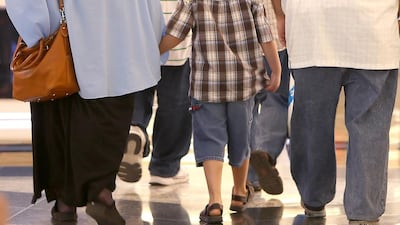Researchers have described the high prevalence of lifestyle-related diseases among women in the GCC as a “ticking time bomb” that is reaching “alarming levels.”
A team of scholars compiled the results of academic reviews published between 2000 and 2016 to analyse the prevalence of cardiovascular disease risk factors, including obesity, physical inactivity, diabetes, hypertension, smoking and metabolic syndrome, among women in the GCC.
The results should jolt policymakers into more action, said Dr Salman Rawaf, co-author of the study 'The Ticking Time Bomb in Lifestyle-related Diseases Among Women in the Gulf Cooperation Council Countries,' published this month in BMC Public Health.
“This is a wake up call,” said Dr Rawaf.
“It is really painful to see so many fellow citizens dying unnecessarily because of government inaction.”
When it comes to obesity among GCC women, for example, the study found the highest prevalence was among the Qatari population where 45.3 per cent of women had a body mass index of 30 or higher, which is how the World Health Organisation defines obesity.
By comparison, the prevalence was 38.4 per cent in Saudi Arabia, 35.2 per cent in Kuwait, 31.3 per cent in the UAE and 29.2 per cent in Oman. In Bahrain, 42 percent of the women met the criteria for obesity.
Part of the obesity problem stems from lack of facilities or access to fitness centres and preventative health care for women in some countries, said Dr Mashael Alshaikh, the study's lead author who is also a Saudi citizen.
“Also, the social norms and the effect of urbanisation, such as importing cheap labour to help the woman in the house, this limits the physical activity, even inside the house,” said Dr Alshaikh.
“Data from the WHO shows that the countries with gender inequality have more health risks, that's why we focused on cardiovascular disease prevention.”
Other factors contributing to obesity among GCC women included the high consumption of fast food, multiple pregnancies and an overall sedentary lifestyle, they said, noting that the level of physical inactivity among women in the GCC is reaching “an alarming level.”
In the UAE, for example, 56.7 per cent of women walked less than 20 minutes a day, according to researchers.
But when it came to inactivity rates in Saudi Arabia and Bahrain, the researchers described the findings as “shocking,” as 98.1 per cent of Saudi women and 98.7 per cent of Bahrainis were reported to be inactive.
For Kuwaiti women, the prevalence stood between 71.6 and 80.5 per cent; 60.5 per cent in Qatar; and 69.3 per cent in Oman. The academics identified a number of potential reasons for the sedentary lifestyles in the GCC.
“In countries like Saudi Arabia, physical education was not included in the public girls' school curriculum until early 2013 and women are still forbidden from driving, which limits their access to fitness centers,” they wrote. “Other barriers include the desert climate, high temperatures and frequent sandstorms, which make it difficult to exercise outdoors; lack of social support and the common use of cheap migrant labour for household work.”
The prevalence of diabetes among GCC women ranges from 6 percent and 44 percent, averaging 21 percent, but “unlike obesity, there is no clear gender gap in diabetes.”
Women from Qatar and Bahrain had the highest smoking rates at 11.6 and 9.2 percent, respectively; while in Saudi Arabia, Oman and Kuwait the prevalence ranged from 0.5 to 1.6 percent, according to one of the studies reviewed by the researchers. In another, the figures were 9 per cent for Saudi Arabia, 0.5 percent for Oman, 0.8 per cent for UAE, 7.9 per cent for Kuwait and 20.7 per cent for Bahrain. But researchers suggested the actual number of women in the GCC who smoke could be higher due to under reporting, since cigarette smoking “traditionally is not accepted among Arab Muslim women.”
The authors, from King Saud University and Imperial College London, called on policymakers to promote greater gender equality throughout the GCC countries to “empower” women, promote their independent decision-making and increase their involvement in health care. They also “highly recommended” that the governments bolster physical education and sports competitiveness among women, improve food labeling, raise awareness of healthy daily caloric intake and “present a more elementary approach in measuring obesity levels” to achieve more accurate results.
“These trends are going up, not down, so we see a failure of public health policies in the GCC, a system failure in the GCC,” said Dr Rawaf. “Countries are waiting for people to become ill to be treated when many of these illnesses can be prevented. Public health unlike the United States or the United Kingdom or Europe is not given the priority it deserves. This is a problem of course for the six GCC countries, unfortunately, we can say without fear and without hesitation.”

